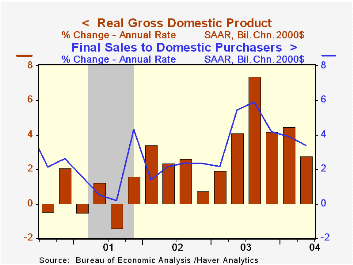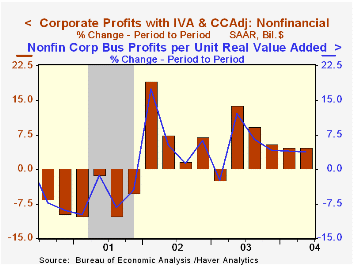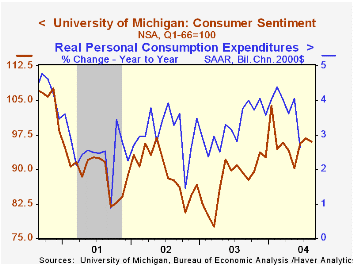 Global| Aug 27 2004
Global| Aug 27 2004Foreign Trade Drag Reduced 2Q US GDP Growth, Domestic Corporate Profits Slower But Firm
by:Tom Moeller
|in:Economy in Brief
Summary
US real GDP growth last quarter was revised slightly lower to 2.8% from 3.0%, about in line with Consensus expectations. Higher exports did not raise US output as much as previously estimated. Export growth in 2Q was revised down to [...]

US real GDP growth last quarter was revised slightly lower to 2.8% from 3.0%, about in line with Consensus expectations.
Higher exports did not raise US output as much as previously estimated. Export growth in 2Q was revised down to 6.2% (AR, 10.5% y/y) from the initial estimate of 18.4% growth. Combined with an upward revision to import growth to 14.1% (11.0% y/y) from 9.3%, that raised the trade sector's subtraction from GDP growth to 1.4 percentage points. News of the record (by far) trade deficit of $55.5B in June drove the revision.
Corporate profit growth slowed considerably to 0.6% (AR, 18.4% y/y) from 13.6% growth in 1Q and 30.2% in 4Q03. Profits in the financial and the foreign sectors fell. In the US nonfinancial corporate sector profit growth remained firm at 20.4% (AR, 26.4% y/y) as firms grew more efficient, indicated by the 3.8% (19.6% y/y) rise in profits per unit of output.
Growth in domestic final demand was a stronger 3.4% versus the initial estimate of 2.7% growth. Real PCE growth was revised up to 1.6% from 1.0% and business fixed investment spending was raised to 12.1% (10.7% y/y) from 8.8%. Growth in equipment & software spending was raised to 13.7% (13.7% y/y) from 10.0%. Residential investment growth was about unchanged at a surging 14.8% (12.8% y/y).
Inventory investment contributed a somewhat larger 0.7 percentage points to growth than the 0.3 points initially estimated, and that was about half the positive contribution in 1Q.
Prices grew the same 3.2% as initially estimated.
This 2001 paper from the Federal Reserve Bank of New York presents an overview of labor & total factor productivity and discusses why it is such an important topic.
Fed Chairman Alan Greenspan's testimony today in Jackson Hole, Wyoming is available here.
| Chained 2000$, % AR | 2Q '04 (Prelim.) |
2Q '04 (Advance) |
1Q '04 (Final) |
Y/Y | 2003 | 2002 | 2001 |
|---|---|---|---|---|---|---|---|
| GDP | 2.8% | 3.0% | 4.5% | 4.7% | 3.0% | 1.9% | 0.8% |
| Inventory Effect | 0.7% | 0.3% | 1.2% | 0.7% | -0.1% | 0.5% | -0.8% |
| Final Sales | 2.1% | 2.8% | 3.3% | 4.0% | 3.1% | 1.4% | 1.6% |
| Trade Effect | -1.4% | -0.1% | -0.8% | -0.1% | -0.3% | -0.7% | -0.2% |
| Domestic Final Demand | 3.4% | 2.7% | 3.9% | 4.3% | 3.4% | 2.1% | 1.8% |
| Chained GDP Price Index | 3.2% | 3.2% | 2.8% | 2.3% | 1.8% | 1.7% | 2.4% |
by Tom Moeller August 27, 2004

The University of Michigan’s consumer sentiment index for August rose to 95.9 from the mid-month reading of 94.0. That still was lower than 96.7 in July. Consensus expectations had been for 94.0.
During the last ten years there has been a 75% correlation between the level of consumer sentiment and the y/y change in real PCE.
The expectations sub-index improved to 88.2 versus the mid-month read of 84.7. The index of current economic conditions eased slightly to 107.9 from 108.4 mid-month.
The University of Michigan survey is not seasonally adjusted.The mid-month survey is based on telephone interviews with 250 households nationwide on personal finances and business and buying conditions. The survey is expanded to a total of 500 interviews at month end.
| University of Michigan | Aug | July | Y/Y | 2003 | 2002 | 2001 |
|---|---|---|---|---|---|---|
| Consumer Sentiment | 95.9 | 96.7 | 5.3% | 87.6 | 89.6 | 89.2 |
| Current Conditions | 107.9 | 105.2 | 8.7% | 97.2 | 97.5 | 100.1 |
| Consumer Expectations | 88.2 | 91.2 | 2.7% | 81.4 | 84.6 | 82.3 |
Tom Moeller
AuthorMore in Author Profile »Prior to joining Haver Analytics in 2000, Mr. Moeller worked as the Economist at Chancellor Capital Management from 1985 to 1999. There, he developed comprehensive economic forecasts and interpreted economic data for equity and fixed income portfolio managers. Also at Chancellor, Mr. Moeller worked as an equity analyst and was responsible for researching and rating companies in the economically sensitive automobile and housing industries for investment in Chancellor’s equity portfolio. Prior to joining Chancellor, Mr. Moeller was an Economist at Citibank from 1979 to 1984. He also analyzed pricing behavior in the metals industry for the Council on Wage and Price Stability in Washington, D.C. In 1999, Mr. Moeller received the award for most accurate forecast from the Forecasters' Club of New York. From 1990 to 1992 he was President of the New York Association for Business Economists. Mr. Moeller earned an M.B.A. in Finance from Fordham University, where he graduated in 1987. He holds a Bachelor of Arts in Economics from George Washington University.
More Economy in Brief
 Global| Feb 05 2026
Global| Feb 05 2026Charts of the Week: Balanced Policy, Resilient Data and AI Narratives
by:Andrew Cates






